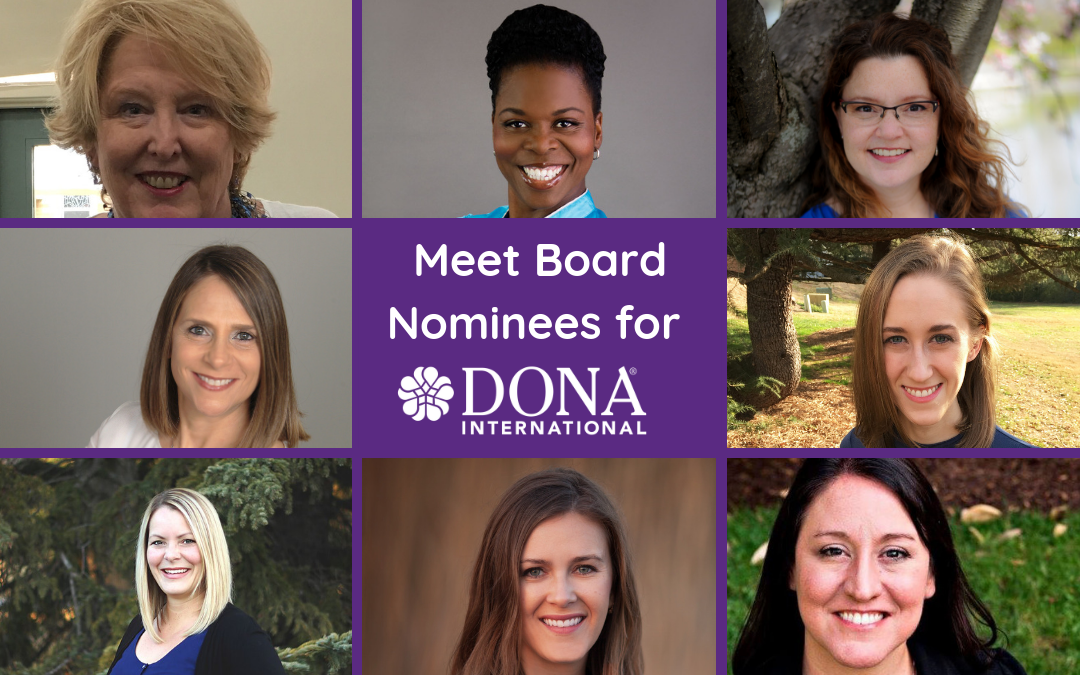By Sharon Muza, BS, CD(DONA), BDT(DONA), LCCE, FACCE, LCE
DONA International is the world’s premier doula organization and relies on the person power and skills of many, many volunteers to keep it running effectively. Our organization is led by an all volunteer board of directors who serve three-year terms and give many, many hundreds (thousands?) of hours to support DONA International and our members, our vision and mission.
Tuesday, September 18th, the 2018 Board Elections will open for member voting. Today I want to share a few Q&A exchanges between the candidates running for the open positions. You can read more about each candidate, find their bios and hear/watch their candidate election video on the elections page. Your vote and your voice is important. Please take the time to review candidate information here and on the elections page and vote when voting opens to members September 18th.
President Elect candidates
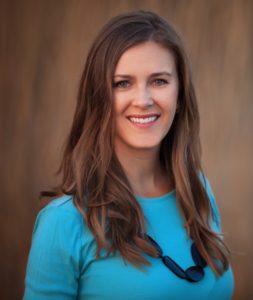 Stefanie Antunes, LCCE, FACCE, BDT(DONA), CD(DONA), PCD(DONA)
Stefanie Antunes, LCCE, FACCE, BDT(DONA), CD(DONA), PCD(DONA)
Sharon Muza: What is the biggest challenge that you feel is facing DONA at this time and what plans do you have for DONA to meet this challenge?
Stefanie Antunes: Tough question! In my prior work, I focused on strategy and intelligence for large companies. One of the things we often discussed was “early warning signals.” Those are the potential issues coming down the pipes that could affect an industry or company. Since I first began in the doula industry I’ve felt we needed to prepare ourselves for the inevitable “professionalization” of our industry. I strongly believe it’s possible to be a heart-centered organization and industry while also valuing the work we do and ensuring our members can have thriving and vibrant careers. To this end, I believe it’s possible to value our rich history while refocusing on the current needs of our members and trainers, and I believe herein lies the most value I can bring to this role through my strong leadership and strategy background.
Sharon Muza: When considering your skills and experience, what three of your skills or abilities are really going to make a difference for this organization as you serve on the board?
Stefanie Antunes: Leadership. Collaboration. Dedication.
Leadership: I’ve spent the last several years as the president of a provincial/state doula association. This has been great experience to help me see what is possible to move our profession forward when a great team works well together under a solid strategic plan.
Collaboration: I’ve noticed a lot of conflict and incivility within the doula community and I believe it’s a disservice to our profession and our personal growth. I’m someone who works well with others, who collaborates ALWAYS, and who can see both sides of every situation in a respectful and compassionate way. I think these are critical leadership skills that I bring to the table.
Dedication: I never give up. Period. I bring a strong work ethic and dedication to everything I do. What more is there to say on this point!
Sharon Muza: What is something unusual about you that most people would be surprised about?
Stefanie Antunes: I speak four languages! People wouldn’t always assume by my appearance that I come from a rich cultural background. I’m absolutely fascinated by culture and different backgrounds. I’ve trained in India and have traveled the world extensively. I look forward to bringing more of the “international” into DONA International.
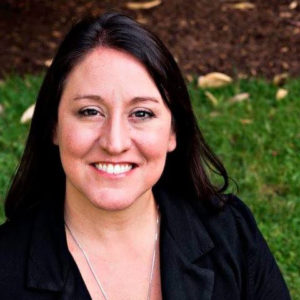 Melissa Harley, AdvCD(DONA), BDT(DONA), LCCE, CLC, FACCE
Melissa Harley, AdvCD(DONA), BDT(DONA), LCCE, CLC, FACCE
Sharon Muza: What is the biggest challenge that you feel is facing DONA at this time and what plans do you have for DONA to meet this challenge?
Melissa Harley: The last two member survey projects (2016, 2018) have given us some great insight as to what the DONA members really want and need from our organization. Based on that info, I feel that one of the biggest challenges is our ability to improve personal support to our members as a whole and incorporate creative mentorship opportunities for our doulas. DONA International is a large organization with members in over 50 countries, so bringing that personal connection is really important as we continue to grow as a profession.
I’d like to see DONA International’s leadership be very intentional over the next few years to find ways to better connect our large membership together (with leadership and each other) and look for strategies and tools to provide more support and mentoring for new and seasoned doulas alike.
Sharon Muza: When considering your skills and experience, what three of your skills or abilities are really going to make a difference for the organization as you serve on the board?
Melissa Harley: Some skills that I bring to the board of directors are, vision, collaboration, and follow through (project management skills). Having previous leadership experience with a weekly volunteer team of over 100 people, I have strong collaboration skills with others to complete projects. I thrive on having strategic and creative vision for the future and combine that with motivation and inspiration to get the job done. Being able to strategize, plan, and execute as well as recognizing skillsets of volunteers, and supporting the work of others will serve DONA International well as we work together to expand the doula profession worldwide.
Sharon Muza: What is something unusual about you that most people would be surprised about?
Melissa Harley: I am a registered Native American with what’s considered dual citizenship (US and as part of Cherokee Nation, OK). While I don’t live on tribal land, I try hard to stay connected with my heritage via tribal communications, connection with family, and continually learning about family history. I feel more and more connected to my heritage, especially as I read reports of the health disparities and inequities in maternal health (to include African Americans, Native Americans, and Alaskan Natives) and feel motivated to try to do my part in working with others to address these disparities and inequities.
Oh, and on a very personal level- I DO NOT eat condiments (mayo, mustard, ketchup or even salad dressing).
Director of Membership – Western
Nikia Lawson, MA, BSW, CD/BDT(DONA)
Sharon Muza: What is the biggest challenge that you feel is facing DONA at this time and what plans do you have for DONA to meet this challenge?
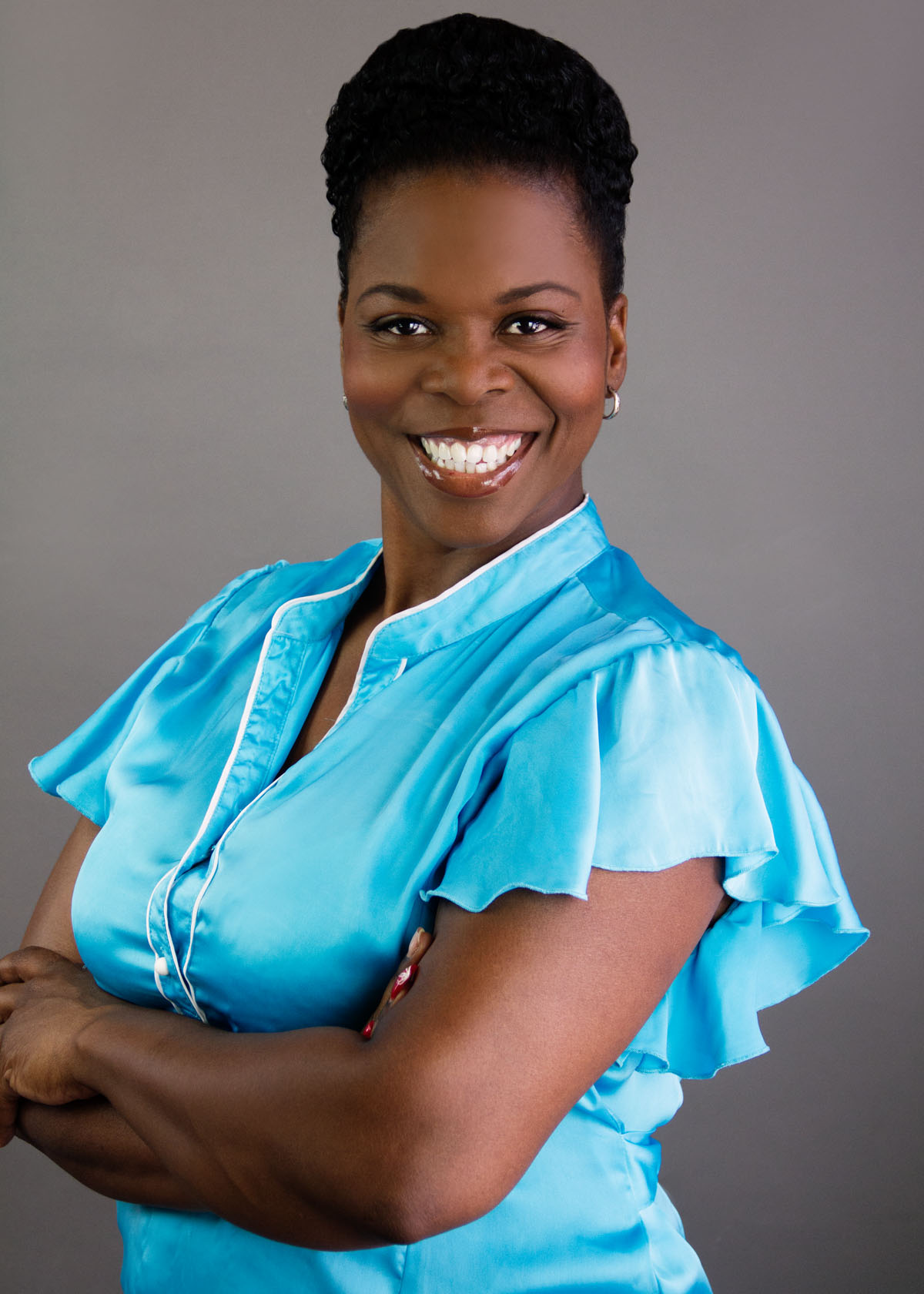 Nikia Lawson: I feel one of the biggest challenges that DONA is facing at this time is an inconsistency with the information that is delivered during the trainings. Many new and inspiring doulas are getting conflicting information during the training that leads them having a lack of understanding of the DONA brand, as well as an understanding of how they will serve their birth community.
Nikia Lawson: I feel one of the biggest challenges that DONA is facing at this time is an inconsistency with the information that is delivered during the trainings. Many new and inspiring doulas are getting conflicting information during the training that leads them having a lack of understanding of the DONA brand, as well as an understanding of how they will serve their birth community.
In order to address this challenge, my intention is to become more involved and visible with the education department. They need additional support while they undergo change that will be inclusive of the entire membership. Also, it’s important to engage the membership and connect with resources to meet their needs that they may have not received during the initial training. Finally, I want to help members navigate the arsenal of resources within DONA to connect the membership to the organization so they can feel more included and involved.
Sharon Muza: When considering your skills and experience, what three of your skills or abilities are really going to make a difference for the organization as you serve on the board?
Nikia Lawson: One of my skills and strengths is the ability to communicate clear and concise messaging to my audience so that we establish relationships that build bridges and bonds that tie us together as a community. This skill will aid me in serving on the board as an integral part of the communication that needs to happen between the leadership and the membership.
Another skill I pride myself on (being a bachelor and master degreed professional in social service modalities), is the ability to mobilize individuals to create change in their lives and communities when they feel stagnant or need to be empowered. As a board member, assisting the membership in finding their collective voice to mobilize change will help shift the narrative around birth in our communities locally, nationally, culturally and globally.
Finally, after having completed the Strength Finders assessment, I came to learn that I have the strength of WOO… winning others over because I want us all to WIN. I am the consummate cheerleader who will motivate and encourage each individual in their respective areas of service to be their best and give their best to this organization. It is vital and necessary that we all have a sense of connection to DONA International so that we can work together as a collective sisterhood & brotherhood to impact change in our birth systems, globally.
Sharon Muza: What is something unusual about you that most people would be surprised about?
Nikia Lawson: There is very little that is unusual about me. However, I will say that there is something unique about me. People are surprised at how transparent I am regarding my views and stance. I am extremely literal and that is surprising to some people because it allows them to interact with me from a totally different perspective than their perceived notion. Many people assume a lot about me based on my persona but are surprised with their actual interactions after they connect with me. It’s all about relationship!
Laurie Levy, CD/BDT(DONA), LMP, LCCE, MA
Sharon Muza: What is the biggest challenge that you feel is facing DONA at this time and what plans do you have for DONA to meet this challenge?
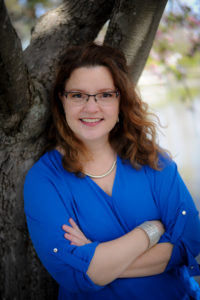 Laurie Levy: One of my goals as Membership Director will be to increase membership involvement in DONA. Specifically, I am interested in growing wide, representative involvement in DONA leadership. We need diversity of input and leadership to strategize how DONA will meet the needs of current and future membership, our profession, and the families we serve. I also want to build pride around being a DONA doula. With so many certification and training organizations to choose from, DONA members are signing on with the not-for-profit organization that professionalized the role of a doula and continues to define what that is. That is a big point of pride! There are lots of benefits for individual doulas to be part of DONA, but I would like us to dream bigger and think about the future of our profession. The larger our numbers, the more political cache we have to impact maternity care.
Laurie Levy: One of my goals as Membership Director will be to increase membership involvement in DONA. Specifically, I am interested in growing wide, representative involvement in DONA leadership. We need diversity of input and leadership to strategize how DONA will meet the needs of current and future membership, our profession, and the families we serve. I also want to build pride around being a DONA doula. With so many certification and training organizations to choose from, DONA members are signing on with the not-for-profit organization that professionalized the role of a doula and continues to define what that is. That is a big point of pride! There are lots of benefits for individual doulas to be part of DONA, but I would like us to dream bigger and think about the future of our profession. The larger our numbers, the more political cache we have to impact maternity care.
Sharon Muza: When considering your skills and experience, what three of your skills or abilities are really going to make a difference for the organization as you serve on the board?
Laurie Levy: 1 – I have high expectations for customer service. Responsiveness is a hallmark of my work style. 2 – I am great (and experienced) at bringing lots of different people together on a project. I am aware that I don’t know everything. I anticipate that this position will have a steep learning curve. Support needed in various birth care setting varies from country to country, state to state. Our membership are the experts on what is happening in their geographic areas and I will look to them to help me understand what they need and can give in their regions. 3 – My son just suggested that I share I am skilled at keeping the big picture in mind, making adjustments as necessary while keeping folks motivated and on task. I would have to agree.
Sharon Muza: What is something unusual about you that most people would be surprised about?
Laurie Levy: I love to get rid of things. Clutter makes me tense, but I do have a couple of collections. One is of tiny glass chickens and the other is things I have found in library books. That second collection includes airline tickets, school pictures, love letters, and a tiny plastic skeleton. When I get a library book I am as excited to see if anything was left in as I am about reading the content.
Director of Certification
Patti Treubert, BS, ICCE-CPE, CD(DONA), CLC
Sharon Muza: What is the biggest challenge that you feel is facing DONA at this time and what plans do you have for DONA to meet this challenge?
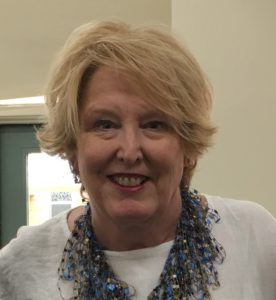 Patti Treubert: The biggest challenge is ensuring those who train with DONA International follow through with certification and maintain active membership. I feel that mentorship is key to achieving this goal.
Patti Treubert: The biggest challenge is ensuring those who train with DONA International follow through with certification and maintain active membership. I feel that mentorship is key to achieving this goal.
Sharon Muza: When considering your skills and experience, what three of your skills or abilities are really going to make a difference for the organization as you serve on the board?
Patti Treubert: Communication\organization, years of involvement with DONA in various roles of being a volunteer, and a sense of humor in times of adversity.
Sharon Muza: What is something unusual about you that most people would be surprised about?
Patti Treubert: I would love to fly with the Hurricane Hunters. I love adventure!
Diana Zacharin, HBCE, CD(DONA), BDT(DONA), BFRP, CHt
Sharon Muza: What is the biggest challenge that you feel is facing DONA at this time and what plans do you have for DONA to meet this challenge?
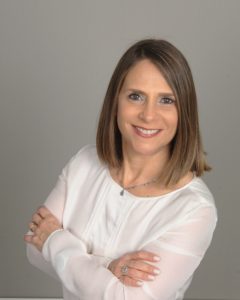 Diana Zacharin: I believe a big challenge DONA is facing right now is the need to stand behind the “DONA International” statement. Right now, we, as an international organization, are missing out some realities in some countries out of the States. I think we need to accommodate the certification requirements to those realities. As the certification director, my goal is to serve with an open heart and listen to the needs of every candidate for certification might have.
Diana Zacharin: I believe a big challenge DONA is facing right now is the need to stand behind the “DONA International” statement. Right now, we, as an international organization, are missing out some realities in some countries out of the States. I think we need to accommodate the certification requirements to those realities. As the certification director, my goal is to serve with an open heart and listen to the needs of every candidate for certification might have.
Sharon Muza: When considering your skills and experience, what three of your skills or abilities are really going to make a difference for the organization as you serve on the board?
Diana Zacharin: I consider myself a good and flexible listener. Living in three completely different countries through my life gave me the ability to build bridges between different cultures. And finally, the three “C”s – collaboration, cooperation, and commitment!
Sharon Muza: What is something unusual about you that most people would be surprised about?
Diana Zacharin: When I was 19 years old I left my parents’ house and moved from Argentina to Israel where I lived for 20 years until we moved to Miami 18 years ago. I have a bachelor degree in psychology and education and a master degree in holistic nutrition. I’m a Bach Flowers practitioner, a Reiki master, and a certified hypnotist. All of these made me the doula and doula trainer I am today.
Director of Advocacy
Jessica Huey, BA, BS, CD(DONA)
Sharon Muza: What is the biggest challenge that you feel is facing DONA at this time and what plans do you have for DONA to meet this challenge?
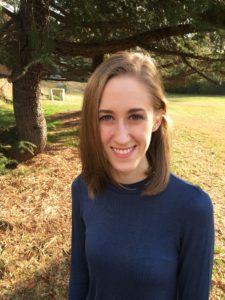 Jessica Huey: As an international organization representing doulas, DONA’s biggest challenge is creating space and advocating for doulas as part of the solution to our world’s serious maternal and infant health issues, and recognizing that the role of doulas is different from one country to the next. As the Director of Advocacy, I will continue to build relationships with organizational partners that elevate the position of DONA to participate in policymaking. By participating in policymaking, DONA can weave doulas into the programs and laws that will bring about greater maternal health and reproductive justice for women around the world.
Jessica Huey: As an international organization representing doulas, DONA’s biggest challenge is creating space and advocating for doulas as part of the solution to our world’s serious maternal and infant health issues, and recognizing that the role of doulas is different from one country to the next. As the Director of Advocacy, I will continue to build relationships with organizational partners that elevate the position of DONA to participate in policymaking. By participating in policymaking, DONA can weave doulas into the programs and laws that will bring about greater maternal health and reproductive justice for women around the world.
Sharon Muza: When considering your skills and experience, what three of your skills or abilities are really going to make a difference for the organization as you serve on the board?
Jessica Huey: In my public health and social work education I have developed strong skills in listening, systematic thinking, and advocacy. In social work education, there is a primary focus on developing excellent listening skills. I believe this skill will help me work with my fellow board members and with partners outside DONA. Public health and social work training are largely about linking complex systems. Maternal healthcare is a web of inter-related systems and organizations and my ability to think critically about the development and challenges faced by large healthcare systems will help me in this role. Lastly, social workers are advocates. As the Director of Advocacy, it is important to have skills in creating advocacy briefs and pitching a platform to external partners. I have developed this skill academically and in practice and I am excited to bring this to the DONA Board of Directors.
Sharon Muza: What is something unusual about you that most people would be surprised about?
Jessica Huey: Five years ago I needed a date for a wedding and posted an ad on Craigslist for fun. I ended up meeting a man who responded to that posting and we are now engaged and will be getting married in May. When people ask how we met I always say, “I found him on Craigslist!”
Erin Moyen, LCCE, BDT(DONA), CD(DONA), PCD(DONA), CLE
Sharon Muza: What is the biggest challenge that you feel is facing DONA at this time and what plans do you have for DONA to meet this challenge?
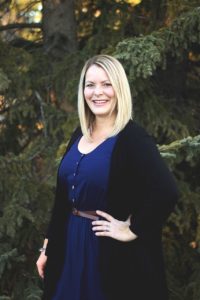 Erin Moyen: I believe one of the greatest challenges still facing DONA at this time is defining our profession and giving the general public enough knowledge/education about the significance and role of birth and postpartum doulas. In order to meet this challenge, I plan to continue advocating for our profession while coming alongside our five advocacy sub-committees as they strive towards improving, advancing and promoting our profession and maternal-child health around the world.
Erin Moyen: I believe one of the greatest challenges still facing DONA at this time is defining our profession and giving the general public enough knowledge/education about the significance and role of birth and postpartum doulas. In order to meet this challenge, I plan to continue advocating for our profession while coming alongside our five advocacy sub-committees as they strive towards improving, advancing and promoting our profession and maternal-child health around the world.
Sharon Muza: When considering your skills and experience, what three of your skills or abilities are really going to make a difference for the organization as you serve on the board?
Erin Moyen: I believe the three skills or abilities that will make a difference as I serve on the DONA BoD are:
- I am a certified birth and certified postpartum doula with over a decade of experience
- I’m extremely committed to the DONA vision, mission and the direction we’re headed in. #DONAProud
- I enjoy and welcome mentorship and leadership opportunities
Sharon Muza: What is something unusual about you that most people would be surprised about?
Erin Moyen: Most people are surprised to hear that two of our three children were born in Switzerland. It was that experience that lit my passion for providing continuous care, as a birth and postpartum doula, to families. This crucial maternity care practice is so often missing for North American families.


